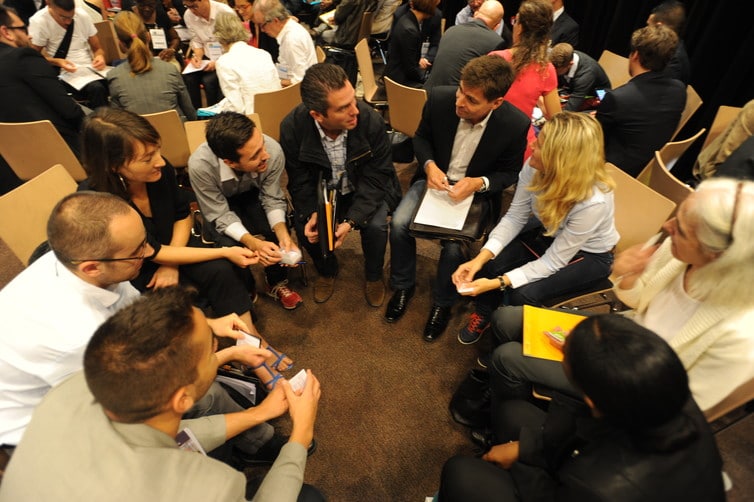Micro-enterprises: a silent revolution?
This text by Professor Michel Marchesnay is published in partnership with the Revue Française de Gestion on the occasion of its 40th anniversary. "Small businesses: breaking out of ignorance?" was ranked among the 19 most influential articles in the history of the journal.
Michel Marchesnay, University of Montpellier

The third industrial revolution has entered the so-called "intensive" phase of innovations linked to the digital and cognitive revolution. The hypermodern "Generation Z" advocates a cosmopolitan, networked individualism and challenges both the wage-based society and managerial dogma. As a result, entrepreneurship is finding fertile ground for expansion: we read that two out of three "young people" would like to start their own business, and that micro-entrepreneurship is a huge source of jobs.

SME trade show
Studying the individual entrepreneur
The individual who undertakes, whether as a "hunter" or "hunted," invests his or her "capabilities," at his or her own expense and risk, in a more or less innovative (original) project, expecting a return (monetary, personal, social, etc.). They work on micro-projects, either out of necessity (limited resources or proximity to their environment) or out of conviction (unique abilities or market).The "enterprise," an organized action, consists of at most an interactive "team," which, according to cognitive scientists, is capped at four people, or seven in the case of delegation or part-time work.
In fact, the visible part comprises only the million or so individual or related businesses, from crafts to the liberal professions, from hi-tech start-ups to food trucks, including street vendors. Pseudo-businesses (de facto salaried employees, front men) should be excluded, and "undeclared" crypto-businesses, including "illicit" activities (drugs, prostitution, smuggling, etc.), should be added. But the digital revolution is constantly expanding entrepreneurship to include exchanges between individuals in networks of the collaborative, social, and solidarity economies, etc. An entropic number of micro-entrepreneurial activities are being created outside or even against the market, leading to a new, non-market-based concept of exchange.
Therefore, a systematic micro-entrepreneurial research program needs to be developed. The dominant paragons and paradigms in entrepreneurship favor positivist work, focused on the treatment of facts in order to identify "constant conjunctions" (Hume) that are likely to "refute" (Popper) the causalities drawn from the "literature." This logical empiricism approach, stuck in the middle between induction and deduction, has the merit of producing bursts of so-called "field" research. However, it proves inapplicable to micro-entrepreneurship for an epistemological reason: the approach is primarily individual and subjective, as it focuses on the individual and the team.
However, each individual has their own history and identity, which means that no other individual is like them, but also that the same "fact" will not be perceived in the same way by "others"—which invalidates the hypothesis of the objectivity of facts and the interchangeability of individuals. Each of us is also subject to the contingency of events, so that we evolve over time, including in our own perceptions.
Finally, everyone distinguishes between what they openly declare as persona and what they think internally as anima (Jung), which largely invalidates declarative judgments. Thus, the entrepreneur and their "team" compare their perceptions, self-organize, and, through "conversation" (Aristotle), build together, muddling through, the logic and practice of action.
The usefulness of cognitive psychology
Working with micro-enterprises (and entrepreneurs) is of primary interest to the younger generations. Trainers and advisors will increasingly need to adopt methods in line with the digital and cognitive revolution (e.g., videoconferencing with entrepreneurs and their teams). With this in mind, the use of real-life cases—which involves close and ongoing links with micro-entrepreneur clubs—is a form of maieutic learning, orinquiry according to Peirce. Unlike the French education system, the aim is to identify problems rather than provide "the" solution. In a complex world dominated by the relativity of causes, the scalability of effects, and the plurality of problems, participants will need to discover and apply typologies and grids adapted to each unique situation.
![]() This approach highlights the growing importance of humanities, in this case cognitive psychology, as a tool for understanding the fundamentals of decision-making and thus improving the "utility" (in the sense used by Mill and James) of micro-entrepreneurship. It is through consistency in the cases encountered that we can ultimately expect empirical generalization and—why not?—a general model, an archetype, of the micro-enterprise.
This approach highlights the growing importance of humanities, in this case cognitive psychology, as a tool for understanding the fundamentals of decision-making and thus improving the "utility" (in the sense used by Mill and James) of micro-entrepreneurship. It is through consistency in the cases encountered that we can ultimately expect empirical generalization and—why not?—a general model, an archetype, of the micro-enterprise.
Michel Marchesnay, Professor Emeritus, Economics, Strategy, Entrepreneurship, University of Montpellier
The original version of this article was published on The Conversation.